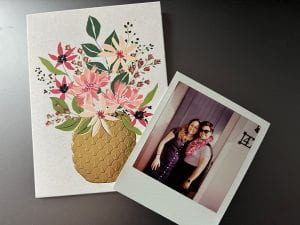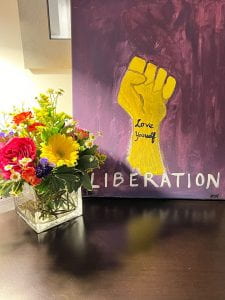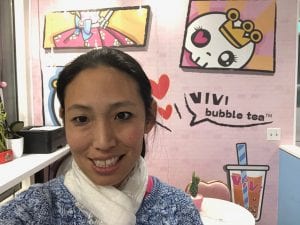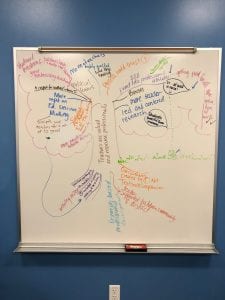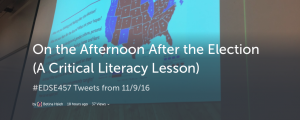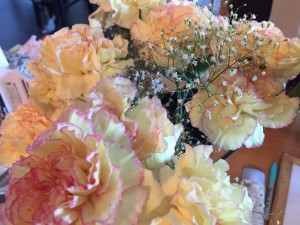Dear Asian American Friends and Family,
I want to start this letter by grounding it in love, and in the recognition of your humanity and the path that each of us is on. I know, from my own walk that, sometimes, the hardest thing we much do is to speak the truth in love, power and solidarity. I also know that now is the moment in which we must take a stand.
It has been a very hard week for our Black American brothers and sisters, in the midst of hard days, weeks, months, and years that are built upon a foundation of 400 years of anti-Blackness which began when white property owners bought into a created mythology and pseudo-science of racial hierarchy and began using it to their benefit to separate white indentured servants from Black indentured servants. To prevent alliances between people with shared interests in joint liberation, people who had come together and rebelled against the property owners oppressing them all, a division was created based on race, that was reinforced by racist policies (e.g. classifying Black people as 3/5 people and calling this a compromise rather than dehumanization; selling Black people’s bodies and separating them from their families) and racial hierarchies (with white people at the top and Black people at the bottom, particularly dark-skinned Black people) that turned groups even against themselves (e.g. the working class, lighter skinned Black Americans and darker skinned Black Americans, assimilated people of color against Black Americans).
Race is a social construct that has been used to separate people in order to preserve a specific hierarchy of power. (If you want to read more about this, check out Stamped: Racism, Antiracism & You by Jason Reynolds & Ibram X. Kendi — appropriate for older youth – adults or Stamped from the Beginning by Ibram X. Kendi — both of these are currently backordered on Amazon.com & Bookshop.org, but don’t let that stop you, put yourself on a waiting list, buy a copy & wait for it to come in stock, find it in a library, borrow it from a friend).
I digress. This is a letter to my Asian American friends and family.
It has been a hard period for us in 2020 as well, particularly in light of increasing incidents of racism & xenophobia against Asian Americans that have come all the way from the discourse of the President of the United States to our communities and neighborhoods. Asian Americans from all walks of life have faced violence and discrimination, including doctors on the front lines and many small business owners who have been specifically and wrongly targeted.
While we have been disproportionately and unfairly targeted in relation to COVID-19, so have our Black American brothers and sisters, who have been dying at disproportionate rates during this public health crisis. Despite arguments to the contrary, these disproportionate rates of death are due to systemic factors which include lack of access to quality medical care and discrimination within the medical system (sometimes based on internalized racist notions of Black bodies as indestructible, which again stem from the dehumanization faced by Black people during slavery).
In the face of this, and in addition to it, over the past few weeks, our Black brothers and sisters have also been dealing with the trauma related to seeing news stories and video of: the extrajudicial killing of Ahmaud Arbery, a man gunned down while jogging through a neighborhood adjacent to his own whose killers walked free for nearly 3 months before being arrested after video surfaced of their crime; the killing of Breonna Taylor, an EMT & Emergency Room technician who was shot in her apartment after police opened fire with a “no-knock” warrant in a drug raid after they had already captured a suspect in that investigation (no drugs were founds in Ms. Taylor’s apartment and her boyfriend had called 911 because he thought that the police, who did not identify themselves and were not in uniform, were breaking into their home); the weaponization of the police against birder Christian Cooper, for simply insisting that a white woman walking her dog follow the rules in an area of New York City’s Central Park dedicate to bird watching; and the incredibly traumatizing 9-minute video of a police officer with his knee on the neck of George Floyd (accused of forging a $20 bill, who was not resisting arrest) which led to his death after Floyd repeatedly stated, “I can’t breathe” and pleaded for his life.
And these are just a few of the high profile cases that have made it to the media in the last few weeks.
The death of George Floyd, the initial failure to arrest the police officer responsible for his death (and the continued freedom of other officers, including an Asian American officer, who stood by and did nothing as Floyd pled for his life) led to a series of protests across this country and around the world. These protests began peacefully and many of them remained peaceful for multiple hours. Some of these protests turned violent and some have resulted in property damage and injuries. Those injured have overwhelmingly been protesters themselves. It is unclear who has been responsible for these protests turning violent and the property loss and damage.
This is where we’re at, as a nation, but where are we as Asian Americans?
Asian Americans are often portrayed as a “model minority,” a monolithically hard-working, high achieving, compliant and successful group of people who have outpaced white people in academic success, thus “proving” that there is no racial discrimination. Remember when I talked earlier about the creation of racial hierarchies by white property owners to separate out Black and white indentured servants? Something similar was done in Asian American history through this idea of the model minority which has been used to erase a historical legacy of oppression and resistance by Asian Americans and Black-Asian solidarity through organizations like the Third World Liberation Front to fight for ethnic studies, and through individual legacies including those of Yuri Kochiyama and Grace Lee Boggs.
These histories have been largely silenced and replaced by this insidious model minority myth which promises that if we stay silent and work hard, we, Asian Americans, will be rewarded for our merit. We should not bite the American hand that feeds us, but continue to do our best, even when we face unfair treatment, because there is more opportunity than unfairness. This myth undermines the idea that systemic discrimination exists and should be fought. The myth is the foundation our “American dreams.” If we have been able to succeed, why haven’t other racial groups like Black Americans?
This myth has led to many Asian Americans’ internalization, acceptance and perpetration of anti-Black racism.
So, briefly, let me explain a bit about Asian American history (because this post is already extremely long). Most Asians in America came after 1952 because of immigrant racial covenants that banned people from Asian countries from coming to the United States from 1917-1952 (completely); from 1882-1917 (partially), opening up more fully since 1965, after which people from the Asian diaspora began to come in large waves such that Asian Americans are now the fastest growing immigrant group in the United States. [Note: Those Chinese, Filipino and Japanese ancestors who were here in the early 1800s and who did face much discrimination and physical violence, fought back, both through protest and through court cases to try to advance Asian American rights in the US.]
This to say that most of us don’t have multiple generations of racial trauma, and NONE OF US has experienced the intergenerational racial trauma of anti-Blackness upon which this country was FOUNDED.
I do not mean to dismiss the historical legacy of anti-Asian discrimination which some Asian Americans’ ancestors have faced, but is is different from the foundation of anti-Blackness in this country.
Asian Americans are willing to ignore our histories, because now, we (some of us, mainly middle class and affluent East and South Asians) have more opportunities than some of our Black brothers and sisters, but these “opportunities” are fragile and can be easily revoked by executive orders banning immigration and words blaming us for diseases (also historical).
We are being used as props by white supremacy to uphold the racial hierarchies upon which this country has been founded, namely, anti-Blackness (and the invisibility of colonialism that has destroyed indigenous peoples, but that is for another day), and being told that we have achieved all we have by our merit.
Yes, we have worked hard, but we have benefited from anti-Blackness. We have opportunities that our Black brothers and sisters are denied because of their name, skin color, zip code, etc.
We may not know it, but we are suffering from this myth. Our success has been bought by our silence. Our success has been bought with the erasure of our identities and histories, our invisibility. And when we are seen or we do speak out, we are seen as foreign or we often speak out in ways that uphold “respectability” and status quo because it allows us to not confront our complicity that is leading to continued systemic discrimination and death of Black Americans EVERY DAY.
This is a critical moment, my Asian American brothers and sisters. We are suffocating in our own silence or when we only speak out when Asian lives are at risk. We are not free. We must choose whether we will remain complicit in our own oppression, that which denies our right to be American, our rights to our own histories, the rights and freedoms of our Black brothers and sisters, or we must choose to begin speaking — with humility and in humanity, being willing to be called in by others in love (especially because as we are learning to speak, we will make mistakes), to begin a dialogue — with one another and with others, we must choose to give in ways that rebuild and strengthen communities and solidarity.
I hope you’ll stand with me and do the every-moment work of unlearning anti-Blackness and standing for our mutual liberation.

